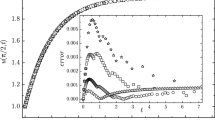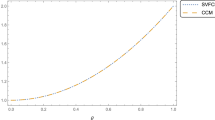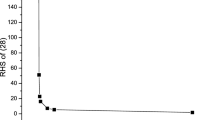Abstract
The aim of this work is to devise and analyse an accurate numerical scheme to solve Erdélyi–Kober fractional diffusion equation. This solution can be thought as the marginal pdf of the stochastic process called the generalized grey Brownian motion (ggBm). The ggBm includes some well-known stochastic processes: Brownian motion, fractional Brownian motion, and grey Brownian motion. To obtain a convergent numerical scheme we transform the fractional diffusion equation into its weak form and apply the discretization of the Erdélyi–Kober fractional derivative. We prove the stability of the solution of the semi-discrete problem and its convergence to the exact solution. Due to the singularity in the time term appearing in the main equation, the proposed method converges slower than first order. Finally, we provide a numerical analysis of the full-discrete problem using orthogonal expansion in terms of Hermite functions.





Similar content being viewed by others
References
Bender, C., Bormann, M., Butko, Y.A.: Subordination principle and Feynman–Kac formulae for generalized time-fractional evolution equations. ar**v:2202.01655v1 (2022)
Bender, C., Butko, Y.A.: Stochastic solutions of generalized time-fractional evolution equations. Fract. Calc. Appl. Anal. 25(2). https://doi.org/10.1007/s13540-022-00025-3
da Silva, J.L., Erraoui, M.: Generalized grey Brownian motion local time: existence and weak approximation. Stochastics 87, 347–361 (2015)
de Pablo, A., Quirós, F., Rodríguez, A., Vázquez, J.L.: A fractional porous medium equation. Adv. Math. 226(2), 1378–1409 (2011)
Erdélyi, A.: On fractional integration and its application to the theory of Hankel transforms. Quart. J. Math. 11, 293–303 (1940)
Gorenflo, R., Luchko, Yu., Mainardi, F.: Wright functions as scale-invariant solutions of the diffusion-wave equation. J. Comput. Appl. Math. 118(1–2), 175–191 (2000)
Gorenflo, R., Luchko, Yu., Mainardi, F.: Analytical properties and applications of the Wright function. Fract. Calc. Appl. Anal. 2(4), 383–414 (1999)
Gracia, J.L., O’Riordan, E., Stynes, M.: Convergence in positive time for a finite difference method applied to a fractional convection-diffusion problem. Comput. Methods Appl. Math. 18(1), 33–42 (2018)
Grothaus, M., Jahnert, F.: Mittag-Leffler analysis II: Application to the fractional heat equation. J. Funct. Anal. 270, 2732–2768 (2016)
Grothaus, M., Jahnert, F., Riemann, F., da Silva, J.L.: Mittag-Leffler analysis I: Construction and characterization. J. Funct. Anal. 268, 1876–1903 (2015)
Heywood, J.G., Rannacher, R.: Finite-element approximation of the nonstationary Navier–Stokes problem. Part IV: Error analysis for second-order time discretization. SIAM J. Numer. Anal. 27(2), 353–384 (1990)
Ibrahim, R.W., Momani, S.: On the existence and uniqueness of solutions of a class of fractional differential equations. J. Math. Anal. 334(1), 1–10 (2007)
**, B.: Fractional Differential Equations: An Approach Via Fractional Derivatives. Springer, Switzerland (2021)
**, B., Li, B., Zhou, Z.: An analysis of the Crank-Nicolson method for subdiffusion. IMA J. Numer. Anal. 38(1), 518–541 (2018)
Kilbas, A.A., Srivastava, H.M., Trujillo, J.J.: Theory and Applications of Fractional Differential Equations. North-Holland Mathematics Studies 204, Elsevier, Amsterdam (2006)
Kiryakova, V.: Generalized Fractional Calculus and Applications. Pitman Research Notes in Mathematics Series 301, Longman, Harlow (1994)
Kiryakova, V.: Generalized fractional calculus operators with special functions. In: Handbook of Fractional Calculus with Applications, Vol. 1, 87–110, De Gryuter Berlin, Germany (2019). https://doi.org/10.1515/9783110571622-004
Kiryakova, V., Al-Saqabi, B.N.: Transmutation method for solving Erdélyi-Kober fractional differintegral equations. J. Math. Anal. 211(1), 347–364 (1997)
Kober, H.: On fractional integrals and derivatives. Quart. J. Math. 11, 193–215 (1940)
Kopteva, N.: Error analysis of the L1 method on graded and uniform meshes for a fractional-derivative problem in two and three dimensions. Math. Comput. 88(319), 2135–2155 (2019)
Li, D., Liao, H.-L., Sun, W., Wang, J., Zhang, J.: Analysis of \( L1 \)-Galerkin FEMs for time-fractional nonlinear parabolic problems. Commun. Comput. Phys. 24, 88–103 (2018)
Li, X., Xu, C.: A space-time spectral method for the time fractional diffusion equation. SIAM J. Numer. Anal. 47(3), 2108–2131 (2009)
Lin, Y., Xu, C.: Finite difference/spectral approximations for the time-fractional diffusion equation. J. Comput. Phys. 225(2), 1533–1552 (2007)
Li, C., Zeng, F.: Numerical Methods for Fractional Calculus. Chapman and Hall/CRC, Boca Raton, USA (2015)
Li, D., Zhang, J., Zhang, Z.: Unconditionally optimal error estimates of a linearized Galerkin method for nonlinear time fractional reaction-subdiffusion equations. J. Sci. Comput. 76(2), 848–866 (2018)
Linz, P.: Analytical and numerical methods for Volterra equations. SIAM, Philadelphia (1985)
Lubich, C.: Convolution quadrature revisited. BIT. Numer. Math. 44(3), 503–514 (2004)
Luchko, Yu., Trujillo, J.J.: Caputo-type modification of the Erdélyi-Kober fractional derivative. Fract. Calc. Appl. Anal. 10(3), 249–267 (2007)
Mainardi, F.: Fractional Calculus and Waves in Linear Viscoelasticity. Imperial College Press, London, UK (2010)
Mainardi, F., Luchko, Yu., Pagnini, G.: The fundamental solution of the space-time fractional diffusion equation. Fract. Calc. Appl. Anal. 4(2), 153–192 (2001)
Mainardi, F., Mura, A., Pagnini, G.: The M-Wright function in time-fractional diffusion processes: A tutorial survey. Int. J. Differ. Equ. (2010). https://www.hindawi.com/journals/ijde/2010/104505/
Mathai, A.M., Haubold, H.J.: Erdélyi-Kober Fractional Calculus. Inspired by Solar Neutrino Physics. Springer Nature, Singapore, From a Statistical Perspective (2018)
Metzler, R., Klafter, J.: The random walk’s guide to anomalous diffusion: a fractional dynamics approach. Phys. Rep. 339(1), 1–77 (2000)
Mura, A.: Non-Markovian Stochastic Processes and Their Applications: From Anomalous Diffusion to Time Series Analysis. Lap Lambert Academic Publishing (2011)
Mura, A., Mainardi, F.: A class of self-similar stochastic processes with stationary increments to model anomalous diffusion in physics. Integral Transform Spec. Funct. 20(3–4), 185–198 (2009)
Mura, A., Pagnini, G.: Characterizations and simulations of a class of stochastic processes to model anomalous diffusion. J. Phys. A: Math. Theor. 41(28), 285003 (2008)
Mura, A., Taqqu, M.S., Mainardi, F.: Non-Markovian diffusion equations and processes: analysis and simulations. Phys. A: Stat. Mech. Appl. 387(21), 5033–5064 (2008)
Murio, D.A.: Implicit finite difference approximation for time fractional diffusion equations. Comput. Math. Appl. 56(4), 1138–1145 (2008)
Oldham, K., Spanier, J.: The Fractional Calculus Theory and Applications of Differentiation and Integration to Arbitrary Order. Academic Press, New York (1974)
Pagnini, G.: Erdélyi-Kober fractional diffusion. Fract. Calc. Appl. Anal. 15(1), 117–127 (2012). https://doi.org/10.2478/s13540-012-0008-1
Płociniczak, Ł.: A linear Galerkin numerical method for a strongly nonlinear subdiffusion equation. ar**v preprint ar**v:2107.10057 (2021)
Płociniczak, Ł.: Analytical studies of a time-fractional porous medium equation. Derivation, approximation and applications. Commun. Nonlinear Sci. Numer. Simul. 24(1-3), 169–183 (2015)
Płociniczak, Ł: Diffusivity identification in a nonlinear time-fractional diffusion equation. Fract. Calc. Appl. Anal. 19(4), 843–866 (2016). https://doi.org/10.1515/fca-2016-0046
Płociniczak, Ł: Approximation of the Erdélyi-Kober operator with application to the time-fractional Porous medium equation. SIAM J. Appl. Math. 74(4), 1219–1237 (2014)
Płociniczak, Ł: Derivation of the nonlocal pressure form of the fractional porous medium equation in the hydrological setting. Commun. Nonlinear Sci. Numer. Simul. 76, 66–70 (2019)
Płociniczak, Ł, Sobieszek, S.: Numerical schemes for integro-differential equations with Erdélyi-Kober fractional operator. Numer. Algorithms 76(1), 125–150 (2017)
Płociniczak, Ł, Świtała, M.: Existence and uniqueness results for a time-fractional nonlinear diffusion equation. J. Math. Anal. 462(2), 1425–1434 (2018)
Płociniczak, Ł: Numerical method for the time-fractional porous medium equation. SIAM J. Numer. Anal. 57(2), 638–656 (2019)
Okrasińska-Płociniczak, H., Płociniczak, Ł: Second order scheme for self-similar solutions of a time-fractional porous medium equation on the half-line. Appl. Math. Comput. 424, 127033 (2022)
Podlubny, I.: Fractional Differential Equations. Academic Press, San Diego, CA (1998)
Sakamoto, K., Yamamoto, M.: Initial value/boundary value problems for fractional diffusion-wave equations and applications to some inverse problems. J. Math. Anal. 382(1), 426–447 (2011)
Shen, J., Tang, T., Wang, L.-L.: Spectral Methods: Algorithms, Analysis and Applications. Springer Ser. Comput. Math. 41, Springer, Heidelberg (2011)
Sneddon, I.N.: The use in mathematical physics of Erdélyi-Kober operators and of some of their generalizations. In: Lect. Notes Math., 457, 37–79, Springer–Verlag, New York (1975)
Stynes, M.: A survey of the L1 scheme in the discretisation of time-fractional problems. https://doi.org/10.13140/RG.2.2.27671.60322
Stynes, M., O’Riordan, E., Gracia, J.L.: Error analysis of a finite difference method on graded meshes for a time-fractional diffusion equation. SIAM J. Numer. Anal. 55(2), 1057–1079 (2017)
Sun, H.G., Zhang, Y., Baleanu, D., Chen, W., Chen, Y.Q.: A new collection of real world applications of fractional calculus in science and engineering. Commun. Nonlinear Sci. Numer. Simul. 64, 213–231 (2018)
Wang, J.R., Dong, X.W., Zhou, Y.: Analysis of nonlinear integral equations with Erdélyi-Kober fractional operator. Commun. Nonlinear Sci. Numer. Simul. 17(8), 3129–3139 (2012)
Watkins, N.W., Credgington, D., Sánchez, R., Rosenberg, S.J., Chapman, S.C.: Kinetic equation of linear fractional stable motion and applications to modeling the scaling of intermittent bursts. Phys. Rev. E 79(4), 041124 (2009)
Zhang, Y.N., Sun, Z.Z., Wu, H.W.: Error estimates of Crank-Nicolson-type difference schemes for the subdiffusion equation. SIAM J. Numer. Anal. 49(6), 2302–2322 (2011)
Acknowledgements
Both Authors are very grateful to the anonymous Reviewers whose valuable comments helped to make the paper more complete and clarify the presentation of the main results. Moreover, we would also like to thank the Editor whose remarks helped to improve the quality of the paper. The research of MŚ was partially supported by NCN Sonata Bis Grant No. 2019/34/E/ST1/00360.
Author information
Authors and Affiliations
Corresponding author
Ethics declarations
Conflict of interest
The authors declare that they have no conflict of interest.
Additional information
Publisher's Note
Springer Nature remains neutral with regard to jurisdictional claims in published maps and institutional affiliations.
Appendix
Appendix
In the following section, we present a rigorous proof of Theorem 1.
Proof of Theorem 1
The asymptotic relation for Erdélyi–Kober fractional integral operator \(I_{\alpha /\beta }^{0,\beta }\) was given in [46], therefore we will not provide a detailed proof of it here.
Since we know the order of discretization of Erdélyi–Kober fractional integral operator, we proceed to find the order of discrete representations of the operator \(D_{\alpha /\beta }^{\beta -1,1-\beta }\). At the beginning, let us consider the operator \(G_{\alpha /\beta }^{\beta -1,1-\beta }\). Note that Erdélyi–Kober fractional differential operator can be rewritten as
where \(R_n\) is a discretization error of the Erdélyi–Kober fractional integral operator (2.6) and \({\widehat{R}}_n= t_n (\frac{d}{d t}I_{\alpha /\beta }^{0,\beta }\psi (t_n) - {\overline{\partial }}I_{\alpha /\beta }^{0,\beta }\psi (t_n)+ {\overline{\partial }}I_{\alpha /\beta }^{0,\beta }\psi (t_n)- {\overline{\partial }}L_{\alpha /\beta }^{0,\beta }\psi (t_n))={\widehat{R}}_{n,1}+{\widehat{R}}_{n,2}\). The first difference, \({\widehat{R}}_{n,1}\), can be estimated in a standard way
where \(\sigma ^* \in (0,1)\) and \(t^* \in [t_{n-1},t_n]\). However, to estimate the order of the second term in \({\widehat{R}}_n\), we need to investigate this term carefully. Note that using again the Mean Value Theorem for Integrals and Sums, and the relation \(c_{n,i}<c_{n-1,i}\) for \(i\in \{1,2,\ldots ,n-1\}\) we have
where \(i-1\le s<\sigma _i <i\), \(0<x<n-1,\ n-1<x_n<n\) and
Furthermore, performing a straightforward calculation, we get
Moreover, note that \(C_n\) can also be written in the following way
Next, we use the Intermediate Value Theorem to get
where \(x^*\in (x, x_n)\). Finally, we have
where \(x^{* *}\in (x,x^*)\). Let us notice that the difference \(|x-x^*|\) does not increase when n becomes larger: \(\psi \) is continuously differentiable on the interval \([0,t_n]\) and due to the fact that when increasing n the contribution of the integral in the second term in (6.2) to \(C_n\) becomes negligible. Next, we use (6.1) to obtain
Note that the absolute value of the second term can be easily bounded from above as follows
where the last inequality was obtained using \(0 \le n s-i\le 1\). Considering now \(S_1\), we evaluate the integral for each i to get
Next, for each \(i\in \{1,2,\ldots ,n-2\}\) we expand \(\theta _i\) in the Taylor series for large n with fixed i/n
Let us notice that for sufficiently large n we can bound \(|\theta _i|\) from above as follows
The formula on the right hand side of the above can be written in the shorter form, \(C\cdot W\!\left( \frac{i}{n}\right) /n^2 \), where C does not depend on n. Moreover, it is easy to note that
where convergence is the result of the definition of a Riemann sum with the set \(\{i/n:1\le i\le n-2\}\) as a partition of (0, 1) and the integrability of the function under the integral sign. The function W(x) has two singularities: at \(x=0\) and \(x=1\). Performing the standard calculation, we get \(W(x)=(\alpha -\beta )x^{\alpha /\beta -1}+{\mathcal {O}}(x^{2\alpha /\beta -1})\) as \(x\rightarrow 0\) and \(W(x)=\alpha (1+\beta )(1-x)^{\beta -1}+{\mathcal {O}}((1-x)^\beta )\) as \(x\rightarrow 1\). Since \(\alpha ,\beta >0\), the function W(x) is integrable around its singular points. Furthermore, it is easy to see that
Based on the above considerations, we get
Finally, we have
where \(C_1\) and \(C_2\) do not depend on n. Taking into account the estimates of all components in \({\widehat{R}}_n\), we further obtain
where \(t^{*},t^{* *},t^{* * *} \in (0,t_n)\). The above estimate together with \(R_n\) yields (2.7).
Let us now consider the operator \(K_{\alpha /\beta }^{\beta -1,1-\beta }\). Similarly to the above considerations, the integral part of \(D_{\alpha /\beta }^{\beta -1,1-\beta }\) is approximated using \(\beta L_{\alpha /\beta }^{0,\beta } \). Now, let us examine solely the differentiation part of the analysed operator. Performing an appropriate transformation, we have
We use Taylor series expansion for \(\psi (x t_n)\) at the point \(x=\tau \) and obtain
Therefore, the expression in the square bracket under the integral sign can be rewritten in the following way
and
where \(\rho _2= \varGamma \bigl (1+\frac{\beta }{\alpha }\bigr )/\varGamma \bigl (\frac{\beta }{\alpha }+\beta +1\bigr )\) and \(\sigma ^*\in (0,1)\). The above inequalities end the proof.
About this article
Cite this article
Płociniczak, Ł., Świtała, M. Numerical scheme for Erdélyi–Kober fractional diffusion equation using Galerkin–Hermite method. Fract Calc Appl Anal 25, 1651–1687 (2022). https://doi.org/10.1007/s13540-022-00063-x
Received:
Revised:
Accepted:
Published:
Issue Date:
DOI: https://doi.org/10.1007/s13540-022-00063-x




